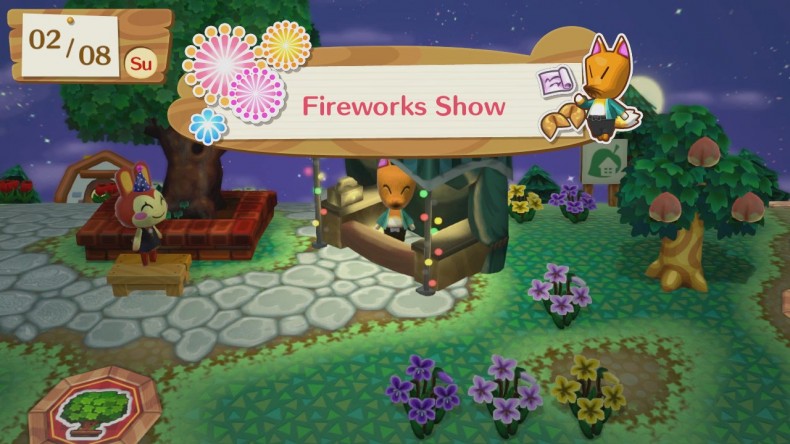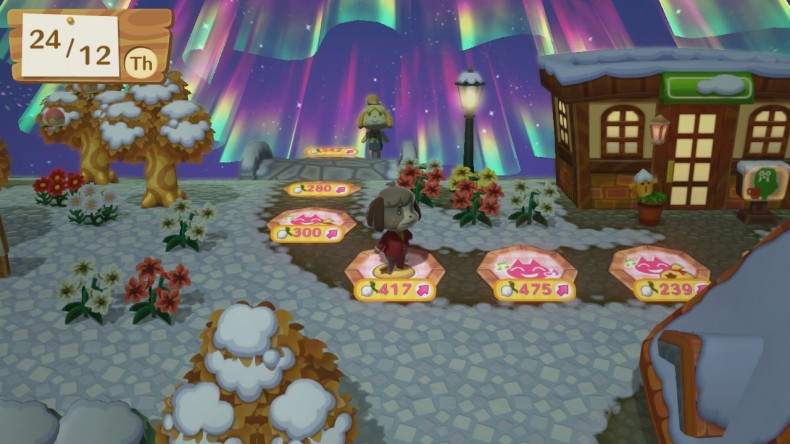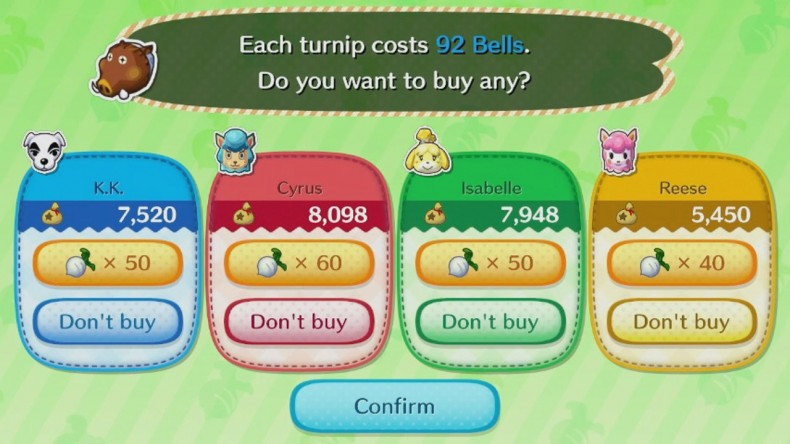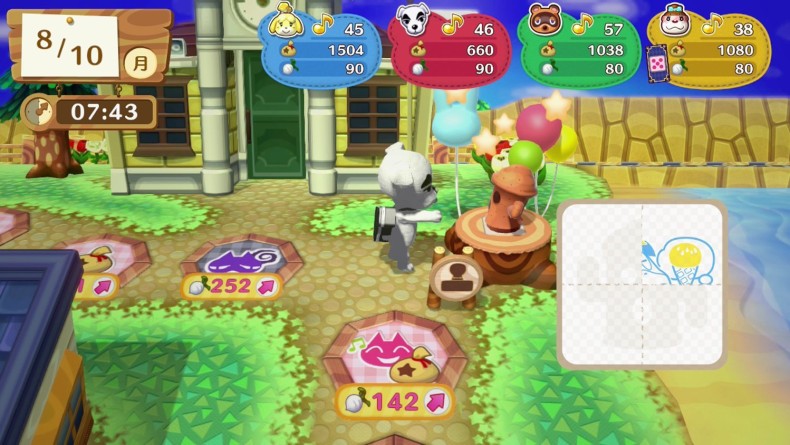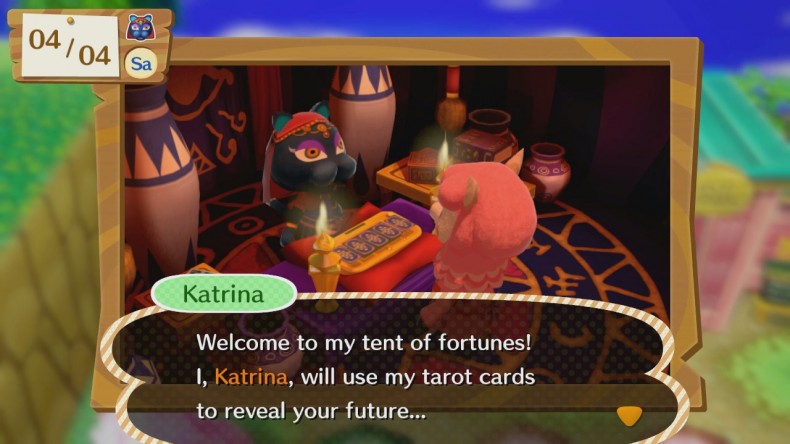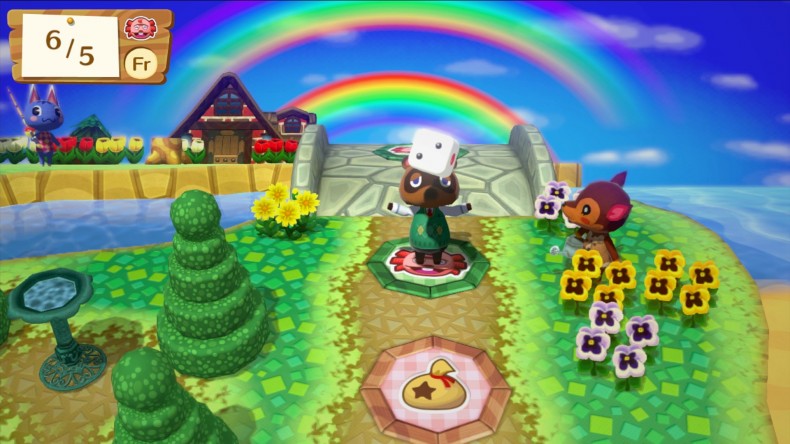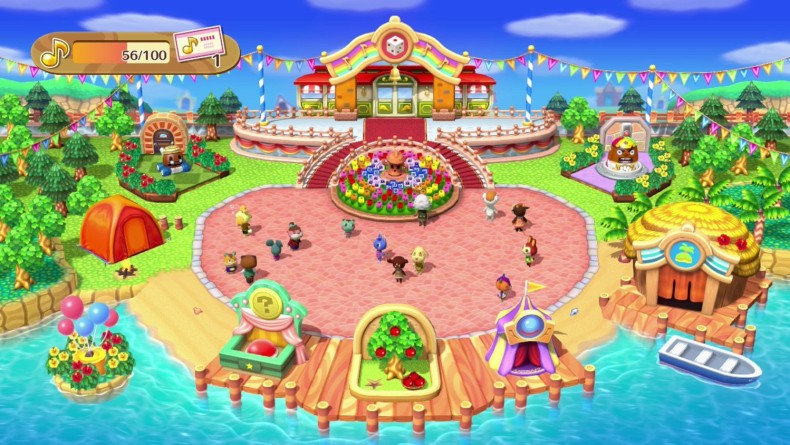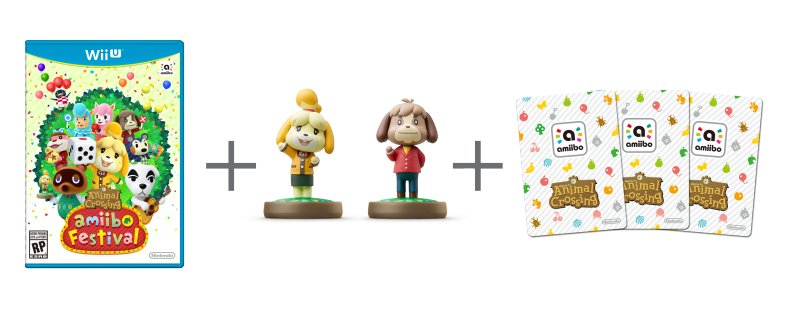Animal Crossing: amiibo Festival Review
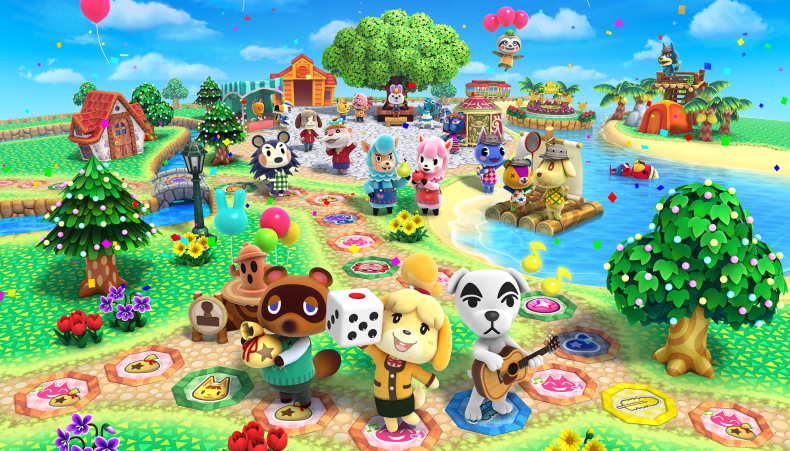
Our complete in-depth review of Animal Crossing: amiibo Festival is finally here! We’ve covered every game mode in the package, plus videos for each of them, to let you know everything there is to know.
This year has marked a large shift for the Animal Crossing series and its future going forward. With the release of two spin-offs, Nintendo has signaled that Animal Crossing is now a top franchise for them. And with that comes an expansion of the series beyond just what we have considered to be Animal Crossing.
The fan base seems divided as it can be on these titles ranging from pure hatred of their mere existence to a sort of underground love for them. No matter where you go on the Internet, you’ll find some of both and often in an aggressive manner.
Some of this distaste is arguably misplaced out of a deep demand for a new mainline game. Knowing that, I’ve tried to go into both Happy Home Designer and now amiibo Festival with as much of an open mind as possible.
So what is Animal Crossing: amiibo Festival anyway? There’s actually a lot more to cover than it appears at first glance, so we’ll go over every mode in the game to let you know what’s hot and what’s not.
Board Game Mode
The star of the show, and what you’ll see in the vast majority of promotional material, is the main Board Game mode. For the most part, it’s a pretty standard board game affair. You roll your dice, land on a space, something happens, you collect the most (happy) points to win.
But as you begin to play, amiibo Festival reveals its own unique Animal Crossing themed quirks. When you land on a space, you don’t just lose or gain points and move on. You’re given a complete animated Animal Crossing scene to watch explaining the space, much like a Monopoly chance card.
This injection of Animal Crossing themed elements into the board game covers much of the game, even to the most basic mechanic of turns. When starting a new game, you pick from one of the twelve calendar months of the year to play in. Each day on the calendar represents a round of turns in-game, and the game ends when the month is complete.
Just like in both the real-world and Animal Crossing, each month on the calendar is unique. If you pick November, then you’ll get to play a Harvest Festival event with Franklin on Thanksgiving. In August, the skies are lit on Sundays with the Fireworks Festival when Redd comes to town selling fortune cookies, just like in New Leaf. It’s worth noting that the seasons correspond with the months too, so the entire look of the game changes depending on when you play.
It’s nothing groundbreaking, but replay value is definitely increased by the calendar. I found myself wanting to try out every month to check out their unique events, and it’s a cute way of making the game feel like Animal Crossing.
Speaking of the calendar, it’s used to bring in a prominent feature on every Sunday — the Animal Crossing series’ famous turnips! Just like in a real Animal Crossing game, you can buy turnips at the beginning of every week. Then throughout the in-game week on the calendar, you’re given opportunities to sell them back for ideally big profits.
In amiibo Festival, those selling opportunities are represented by spaces on the board boasting a sell price. Some spaces offer a mass profit, others barely cover your expenses… or don’t. Every time you end your turn, you have the choice of selling your turnips for the price marked on the current space.
These prices aren’t static either, they change throughout the week in different market patterns. Playing with the turnips every week and deliberating whether to sell or not while aiming for the highest price is highly enjoyable.
Unfortunately, as much fun as they are, the turnips are mostly the end of the line for strategy inside the board game. Outside of them, you’re often just mindlessly rolling the dice to get to the four corners of the board as soon as possible.
You see, each corner of the board has a friendly gyroid who awards you with a stamp. Collecting each stamp gives you Happy Points (the player with the most wins) and a massive Happy Point bonus for all four stamps.
The problem is that these Happy Points are so essential to winning that it encourages players to dive straight towards each corner. There’s little incentive offered to take a different path. With this in mind, it’s easy to feel like you’re just going through the motions of getting to each corner regardless of what’s in your path. And with no mini-games anywhere to break it up, the game can become dull outside of turnips.
To change things up though, some special visitors from the Animal Crossing series do show up in your town from time to time with an activity. Redd will sell you special effect cards, Katie and Dr. Shrunk give dice cards, Katrina hands out fortune cards, and Phineas offers other bonuses.
They’re cute the first few times, but you grow tired of them fast after playing a few games and especially when it comes to their dialogue. It’s easy for them to all feel the same: they come to town, you land on their space, you often get a card of some kind. Rinse, repeat.
And while you should probably expect it from a game like this, it’s worth mentioning just how much emphasis there is on luck here. I’ve heard other reviewers refer to amiibo Festival as like a version of Candy Land, and that’s not far off in regards to skill. The only way to directly control anything without luck is through dice cards, and they are extremely rare. In an average game, a player is unlikely to ever see more than one or two.
So after roughly an hour of watching Monopoly chance cards, gathering gyroid stamps, and selling turnips, the game comes to a close. Your happy points are counted up, and because money equals happiness, your bells convert into happy points with the happiest player winning the game.
And well, that pretty much covers the entire board game in Animal Crossing: amiibo Festival. The in-game calendar and its events plus the stalk market are nice aspects, but there’s little to be impressed for beyond that.
No, you’re not going to find a skill based and fast moving game here. But an enjoyable and laid back relaxing experience can be had here if you’re not expecting too much. Just know that you will throw your GamePad when inevitably your crap luck screws you over.
Watch this video below from NintenDaan on Twitter for an example:
…YOU CAN’T BE SERIOUS. #ACamiiboFestival pic.twitter.com/hoPvYe4Poo
— Daan Koopman (@NintenDaan) November 19, 2015
The best part? It’s a New Year’s Eve event, so it’s coded into the game to occur on the last day, just to make sure you lose.
Sidenote: It is worth noting you can customize the game mode board through public work projects and villager homes later. In-game outfits can unlock for your characters too by saving Happy Points to your amiibo figures. (be warned that it takes a loooooong time to unlock them all…) These features don’t change the game in any big way, but they’re a nice added touch.
[the_ad id=”6416″]
Amiibo Card Mini-Games
Although it’s the main highlight of Animal Crossing: amiibo Festival, there is more to this game than just the board game. After playing two rounds, you can begin unlocking another eight mini-games which make use of Animal Crossing amiibo cards.
Since we don’t want to spend too much time explaining each mini-game, we have included videos showing off a full round of gameplay of every game. Make sure to give them a watch!
What The Hell Nintendo Sidenote: Some of these games actually need more than three amiibo cards, which is what comes packaged in the bundle. In other words, amiibo Festival locks you out of several games if you don’t buy additional cards! Wow. That would already be insulting to begin with, but made even worse with how overpriced the game is.
Desert Island Escape
To avoid depressing my entire audience immediately, I’ll start with the best mini-game first, rather than leave it to last.
In Desert Island Escape, you command three Animal Crossing characters of your choice deserted on a tropical island. Using your chosen characters and their skills, you must explore the island for essential items to build an escape raft.
Exploring the island is done on a hexagonal grid, sort of like Settlers of Catan or Civilization. Some tiles have hidden materials used to build helpful tools, others have menacing creatures waiting to eat you. You’ll need to find fruit trees and other sources of food too, or face starving to death.
And this mini-game (is it a mini-game?) easily has the most content of any game in amiibo Festival with 3 difficulties totaling 30 unique maps to play. There’s over fifteen unique villager types too with their own abilities making the gameplay varied if you have extra amiibo cards.
Desert Island Escape is one of those moments where I discovered a game that I always wanted, but never knew it. In many ways, this is the highlight of amiibo Festival. Perhaps I’m giving it more credit than deserved because of the other games surrounding it, but it is a lot of fun to play. I’ve included a video above showing off a full round of gameplay to judge for yourself.
Quiz Show
As you might expect from the name, Quiz Show is a trivia mini-game which tests you on your Animal Crossing knowledge. To be fair to the game, it can actually be quite challenging with its questions. Be prepared to recite the exact name of clothing, gyroids, fish, and more.
Quiz Show is actually best played in single player though due to the cumbersome implementation of multiplayer. You see, in multiplayer, you must tap your amiibo card at the right moment to “buzz in” your answer. So basically imagine yourself and three friends huddled around the GamePad with your cards ready to be fired… It’s a mess, and you might even ruin your precious amiibo cards from bending them in the process.
Balloon Island
Balloon Island is a bafflingly simple mini-game. There’s a small platform in the middle of an ocean with small balloons floating above. Tap an amiibo card to drop a character onto the balloons, and gain points for bopping as many as you can with multiplier bonuses depending where you land. And well, that’s it after three rounds.
Despite the simplicity though, it can be fun… for a couple minutes at least the first few times. Unfortunately, that’s a common theme here as we go through the rest of the mini-games.
Mystery Campers
This mini-game is one of those logic puzzle games, with an Animal Crossing theme. Scan in six characters using amiibo cards, and four of them will randomly distribute into four tents. Your job is to work out who is in each tent through the process of elimination, logic, and simple trial and error.
I can’t really knock Mystery Campers for its gameplay, it’s admittedly fun. But yet again, I can’t drive up any urge to play it more than once or twice.
Acorn Chase
In Acorn Chase, you run around a grid desperately in search of healthy acorns, while the scary Cornimer robot from New Leaf chases you. If that sounded exciting, don’t worry, this game will let you down too! There’s only a single trio of levels and the use of amiibo cards is frustrating to say the least.
It often it feels like you’re more battling against the NFC Reader and your cards than the actual game. I’ve been screwed over by the NFC Reader reading another card next to the other in my hand many times.
Amiibo Card Battle
I’ll be honest: I don’t even fully understand how this game works. Two (or more) players play an amiibo card, the highest number wins, unless the card matches the symbol in the middle of the screen.
And… that’s it? I feel like I must be missing something crucial here because I can’t fathom how this is remotely considered fun otherwise. Not to mention how it all falls apart if, you know, actually look at what the player next to you does. Are you supposed to close your eyes? Who knows, the game sure doesn’t tell you! Watch our video and judge it yourself.
Fruit Path
Fruit Path sends you and a friend on an daring mission to gather fruit down a linear path with pitfalls in your way. You just tap an amiibo card to walk the number of spaces specified on the card and gather fruit in the path. But trap yourself in a pitfall and you’ll lose fruit, which is what you need to win the game.
I struggled to find any appeal at all in this game. There may be some strategy at the beginning when there are fewer pitfalls, but before long there are so many it just becomes pure luck. Fruit Path is a solid pass.
Resetti Bop
I don’t know why this game even exists honestly other than just to use the symbols on the amiibo cards. It’s just some kind of speedy version of rock-paper-scissors using amiibo cards.
Just like Acorn Chase though, the experience of using multiple cards in quick succession on the NFC Reader can be a disaster. Resetti Bop is definitely a play once and forget it mini-game.
[the_ad id=”6418″]
The Bottom Line
Animal Crossing: amiibo Festival isn’t a terrible game, but it’s not worthy of much praise either. The main board game attraction can be enjoyable in the right mood if you’re looking for a laid back time. It’s nowhere near worth the asking price though, and it will get boring at times.
On the other hand, most amiibo card mini-games can be seen once and forgotten except for Desert Island Escape, which is great. And it’s hard to say that some are even worth your time to play once.
Animal Crossing: amiibo Festival‘s bundle is unfortunately a full priced retail game. You are getting two Animal Crossing amiibo included in the bundle, but you’re hardly getting $60 ($80 in Canada) worth of gameplay value.
I wouldn’t recommend amiibo Festival to everyone, but if you’re a fan of leisurely played board games and the Animal Crossing series, it may be up your alley. Just know what you’re buying, and don’t expect too much here. Hopefully you have a solid idea of what you’re getting into from my review and videos here.
Buy Animal Crossing: amiibo Festival at Amazon US (MSRP $60), or at Amazon Canada (MSRP $80).
What I Liked
- Favourite Animal Crossing elements like the real-world calendar and turnip stalk market are cleverly woven into the board game.
- Desert Island Escape is a hidden Animal Crossing gem with a surprising amount of content to experience.
What I Didn’t Like
- Majority of amiibo card mini-games are play once and forget, or worse.
- Over the top luck gameplay in the board game can be maddening and unfair ruining the experience at times.
- The board game can become boring fast when little is happening, almost like the game is playing itself. And do I really need to tap my amiibo figure to roll every single turn?
- Extra amiibo card purchases are required to play two mini-games, and fully enjoy Desert Island Escape.
Being such a divisive game, I’d love to hear your thoughts too on amiibo Festival if you’ve played it. Please feel free to share in the comments, and I’ll try to respond when I can!
Full Disclosure: Nintendo of Canada provided a retail copy of the Animal Crossing: amiibo Festival Bundle to Animal Crossing World for review.
Get The Latest Animal Crossing News & Guides
Sign up for our newsletter to never miss out on the latest Animal Crossing news, guides, and deals with email updates!
amiibo amiibo Cards Animal Crossing: Amiibo Festival Review Videos Wii U


 10 years ago
10 years ago


